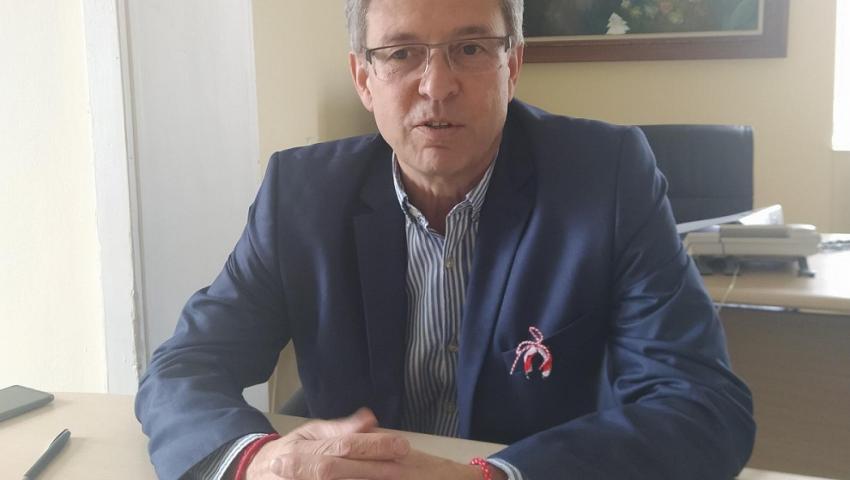Municipalities to introduce a ban on the use of certain fuels for heating
I am not in favor of incineration, but we are currently generating so much waste that it would be difficult to do without such an option for waste treatment

Raya Lecheva
We are talking with Nikolay Sidjimov, Deputy Minister of Environment and Water, about the new way of waste management, which the ministry will try to introduce in order to reach only 10% of landfill waste. At present, on average, each person generates 400 kg of household waste. If we take out of them everything that can be recycled, to take out the mechanical impurities to be used for clogging, if we manage to hand over some of them to the cement plants, there could be 10% left that we can't use for anything else except to deposit. The goal is achievable, the question is how effectively we will fulfill our tasks, as the municipalities, the ministry and the citizens, Sidjimov believes.
Nikolay Sidjimov is from Kardzhali, but has worked for many years in Sliven, where he is one of the founders of the Regional Center for Economic Development (RCED). He is one of the founders of the Association of Environmentalists of Municipalities in Bulgaria - ASECOB. In the ministry he is responsible for the topics "Waste", "Air" and the Executive Agency for Environmental Protection. He specializes in waste management in Sweden and Japan, NGO management at Johns Hopkins University in the United States, business support and entrepreneurship development at the University of Wisconsin College of Business.
Mr. Sidjimov, what new type of waste management system will work, as commented by Minister Sandov, in order to achieve 10% landfill?
This means all municipalities and we as citizens to create the best possible conditions to use waste as a resource, to recycle, to reuse. We need to work with people and explain their role. How to make sure that they do not generate so much waste, because the best waste is the one that is not created, how to reuse and recycle it. In this regard, we will make the relevant legislative changes.
One of our most ambitious tasks is to introduce a deposit system as in other countries and achieve up to 90% recycling of all plastic bottles used for soft drinks, glass bottles, jugs. For the other packaging we will use the old system with colored containers and packaging recycling organizations.
It is best for the municipalities to separate the fractions so that the biodegradable ones do not go to landfill, but are used for composting. Construction of three additional installations for anaerobic decomposition of biodegradable waste has begun - in Blagoevgrad, Ruse and Burgas. There may be some problems in Ruse and it is uncertain whether the project will be implemented.
What are the problems and is the project under the "Environment" program?
The project is under the Operational Program "Environment" 2014-2020. The problems are related to the implementation itself within the deadlines.
Garbage fee methodology will be one of the first projects under the "Environment" program
But more effective separate collection schemes must also be introduced in the municipalities themselves, and information campaigns will be made for people on how to separate waste. Within two years of the release of the census data, we are obliged to introduce the "polluter pays" principle. The system is to pay for the waste we dispose of, to measure the amount of waste we dispose of and to pay a fee on that basis. At the moment, what we pay is rather a tax that does not really reflect how much we throw away, but is paid on the basis of a tax assessment and does not encourage people to take steps to reduce waste.
I understand that the two major changes in the waste sector will be the introduction of a deposit system and a garbage fee. We have been talking about a change in the calculation of the municipal waste tax for more than a decade, municipalities and the state are shifting the responsibility. Where are we starting now to finally realize this model?
My personal view is that even now there are all the necessary prerequisites for a municipality to introduce such a fee. The argument that the state has not introduced such a methodology to say exactly how to introduce such a system is rather a transfer of responsibility. But municipalities are definitely not ready for such a change. One of the first projects to be funded under the new Operational Program "Environment" is to develop such a methodology and use it by municipalities. There are funds provided, exactly on this topic we had talks with the National Association of Municipalities about 10 days ago and I hope that with this project will be given all possible options for municipalities to be able to implement it. It is not just a question of funding, but also of desire. In some municipalities, such as Svilengrad, Zlatograd and smaller municipalities, these things are already happening, they have seen the effectiveness of introducing such principles and are working in this direction.
